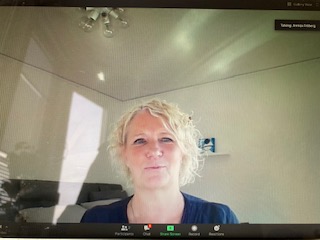New kind of working is becoming stressful

Many people have been working from home for almost two months now. The coronavirus crisis has created a new and uncommon kind of working day without the daily small talk by the coffee machine. How are we all feeling, actually?
“We have faced an entirely new situation with a big switch digitally and physically for all of us. And clearly, we are experiencing and managing this in different ways,” says Annica Fröberg, Director of Personnel at KTH.

At the beginning of the crisis, it was very much about helping employees get back to Sweden and vice versa, getting hold of those that had been away on business travel and in purely practical terms, making switch to remote working, says Fröberg.
Ergonomics and the risk of loneliness have been two important elements in what has become the new full-time workplace for many people, their home.
“Some people have numerous zoom meetings in a day. Others have maybe just one a week. Being part of an environment and feeling seen are fundamental needs in a workplace. This becomes even more apparent in a crisis such as this.”
How important are managers in this respect?
“I think it is especially important that a manager is visible, clear and available for their employees whatever the channel.”
The majority of employees at KTH have been working from home, but a few have been on site to arrange the switch and to keep everything going. Teachers, cleaning staff, IT personnel, payroll administrators and coronavirus researchers, to name a few.
“We have many everyday heroes that have been ensuring everything is working on site.”
And others have been working hard from home or maybe alternated between coming onto campus now and again.”
When it comes to the work-life balance, the line between the two has not only disappeared in purely physical terms but also mentally. The digital way of working can mean it is easy to forget to take breaks and to work too long. Plus, certain work tasks may well have changed or disappeared as a consequence of how KTH has been affected by the crisis.
It is likely that the Swedish Public Health Agency recommendation that people should work from home wherever possible, will remain in place until the summer at least. How should we get through this?
“It’s a case of staying in contact with colleagues, boosting each other, taking part in activities when you feel like it, continuing to focus in the knowledge that we are going to come through all this.”
Inviting people to a Zoom coffee break, Zoom breakfast and all sorts of other possible Zoom get-togethers can be a good idea. One way to establish a clearer line between work and free time can be to go for a walk to and from your home workplace.
Fröberg also explains that all employees have a right to three calls to company healthcare support line if they feel things are getting on top of them or if they want help in sorting out and reflecting on concerns. You can do this without having to get the approval or involvement of a manager or employer.
“If you think you need more sessions, it can be worth contacting HR at your school in the first instance, and secondly HR centrally.”
The whole of our economy has been thrown off balance as a result of the crisis and many people have become unemployed. Can people become worried about their own situation?
“Yes, but at KTH, nobody is going to be made redundant or at risk of being laid-off so this is nothing to worry about at this moment in time.”
What about the future?
“We aim to have everyone back on campus this autumn, and that we will be able to resolve everything in the best way and that everyone will still be with us then.”
Words: Jill Klackenberg

